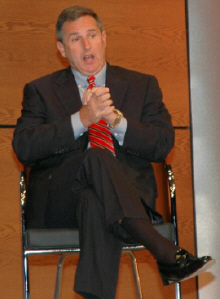HP's Mark Hurd: Thinking about zeroes


He reiterated that HP doesn’t intend to spin off the printer business or exit the PC space, and that the company would maintain its R&D investment, currently about $3.6 billion annually and yielding 11 patents a day.
Hurd is clearly a man of numbers. When he speaks, he often numbers the points in his response to a question, and is known to metricize (Hurd’s term) everything in what HP calls the total customer experience. One of the numbers that seems to be prominent in Hurd’s thinking about where to take HP in the next five years is zero.
First, he said CIOs won’t be satisfied until their IT budget goes down to zero. Secondly, he said that only companies with R&D can deliver another zero—a humanless data center. With long-term investments in servers, storage and management, Hurd is aiming HP at automating IT, taking the cost (much of it human) out and become the premier utility computing company. “At its core, HP has the best technologists on the planet Earth,” Hurd said. HP research is “focusing on trends, such as how far to push virtualization so you get true utility computing, how to push the management thesis farther, operatorless data centers and digital media centers that change the way media is pumped into the home,” he added.
He views IBM as his chief competitor. “I have been competing against IBM my whole career. It’s a good company, with good management and a good team. At the same time we have different strategies,” Hurd said. He describes IBM as having a mainframe ecosystem and more deep in management consulting. Sun, he said, needs to get its financial condition fixed and is less open than HP. “Our biggest issue is ourselves. Once we get our house in order we can be a little more proactive with our statements,” Hurd said, referring to making quips about rivals, like Sun CEO Scott McNealy likes to do.
He said the company is making progress in eliminating the previous matrixed organizational structure led to “lunatic conclusions,” with too many people touching a decision. “We need to make decisions closer to the customer. If we make a bad decision, change the person,” Hurd said. “More than anything about the new model is bringing clarity, accountability and responsibility across the company.” He estimated it would take four to five years for HP to build the “best” sales force.
He also described HP and Intel “ out on a peninsula” supporting the Itanium chip.
I have always found HP’s Adaptive Enterprise to be amorphous, more a statement of direction than a coherent set of products and services. Hurd was asked whether there was stood behind HP’s adaptive enterprise. He responded that he fully supports it as a framework. “It’s an appropriate framework. That said, we have to make sure we have the product deliverables against that framework. We have to do better there,” Hurd said.
Hurd was also asked about whether the services business was a margin enhancer or a real business. “There is strategic debate how far up the stack we go. BPO, business process outsourcing, is a very broad category. Like it or not at HP we are technologists, not executive compensation consultants. We will stay very focused on services as it relates to technology—such as call centers, IT outsourcing and managed services.” He added that to that degree HP doesn’t make all products, the company will partner for solutions and be agnostic about the technology.
Hurd talks a good game. The stock is up more than 30 percent, and the wheels are in motion to execute on his vision. Whether, HP will be the first or most successful company at deliving the holy grail of IT automation, remains to be seen, If HP fails it won't be because it didn't have the metrics or discipline to measure its progress along the way. It will because HP failed to “invent” the future.